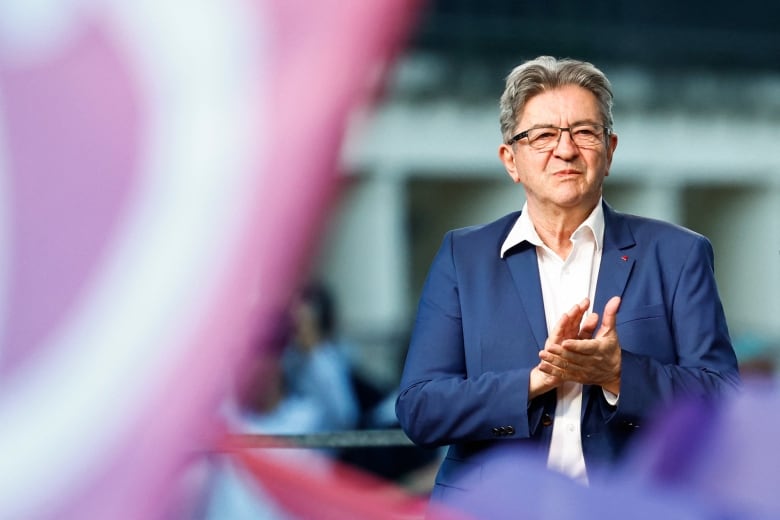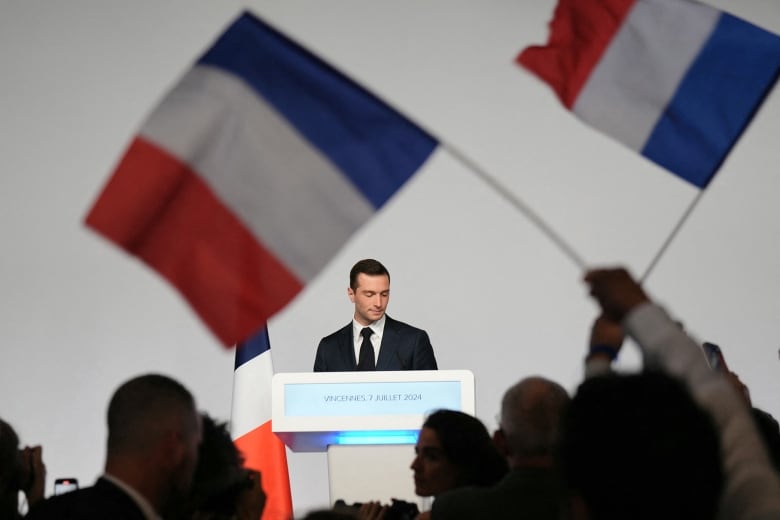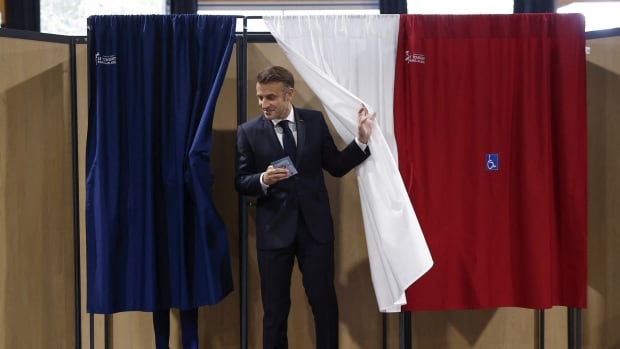France is a republic created by a general who wanted to be a monarch. So, more than 65 years ago, Charles de Gaulle designed a presidency with vast powers to name governments, call elections, pass laws without a vote and launch nuclear missiles.
Like powerful monarchies of the past, its politics are irregularly punctuated by popular revolts.
A week ago, the latest revolt seemed about to topple — or at least severely wound — the sitting president, Emmanuel Macron, who believes the French regret beheading their last king and want to be ruled by a Jupiter-like leader.
The extreme-right National Rally captured a third of the votes in the first round of French legislative elections, which Macron unexpectedly called “to burst the abscess” of a fractious National Assembly, as he put it.
He wanted a referendum on the far right. That referendum almost beheaded Jupiter.
But a week in politics is a long time. And elections in France are a complicated two-step minuet. It’s not enough to come first in the first round — a candidate in a riding must win 50 per cent of the votes or face the voters again.
In the second round of voting on Sunday night, the National Rally, with its allies, was bounced into third place, with 143 seats (out of a total of 577). The winners on the night were the New Popular Front, a quarrelsome coalition of five left-wing parties. They only have 190 seats, however, far from a majority of 289.
Macron’s centrist three-party grouping, Ensemble (or Together), came second with 158 seats, losing almost 90 seats compared to legislative elections two years ago.
WATCH | French voters back lefts, block far right in second round of voting:
An early lead in second-round election polls for France’s left-wing alliance garnered shock and relief as it appeared to be an upset over far-right rivals that led after the first round of voting.
Not surprisingly, there was little cheering in the presidential camp. Macron’s prime minister and chief lieutenant, Gabriel Attal, announced he would resign but carry on as a caretaker. Macron himself said nothing.
The National Rally provokes fear because many in France believe it wants to create an “illiberal democracy,” paying only lip service to laws, much like the regimes in Hungary and Italy it is friendly with. It even financed itself for almost 10 years with a loan from a Russian bank.
Still, the desperate “anything but them” electoral tactic proposed by the government — which called on voters to rally round the candidate best placed to beat the National Rally in each riding — had succeeded.
As Brice Teinturier, the head of IPSOS, a major French polling firm, said on French television, “negative mobilization worked. It shows that fear of the National Rally still can drive voters to defeat them.”
‘The tide is rising,’ says Le Pen
The accent on the negative also left the country with no workable majority in sight.
Almost immediately, the leader of the left, Jean-Luc Mélenchon, said the next prime minister should be one of his MPs. Macron has called Mélenchon an ultra-leftist and refuses to work with him.
Negative mobilization produced a predictably furious reaction from the National Rally’s Jordan Bardella. The 28-year-old had led the party’s campaign and had talked openly of becoming France’s next prime minister.
He denounced what he called “an alliance of dishonour” that had blocked his party and was “throwing France into the arms of the extreme left.”

The Rally’s leader, Marine Le Pen, was publicly more serene. “The tide is rising,” she said. “Our victory is merely postponed.”
“Our victory” would be a triumph in the presidential election of 2027. That is the powerful prize she seeks on what would be her fourth attempt.
The National Rally is the step-child of the National Front, created by Le Pen’s father, Jean-Marie, in 1972. He was twice convicted of denying the Holocaust, and his party members frequently voiced antisemitic and anti-Muslim views.
Marine Le Pen has softened the party image, changing its name and bringing forward the smooth, calm spokesman Bardella. But its core policies are unchanged. It would block almost all non-European immigration and create two classes of French citizen: those born in France with only one passport, and dual nationals.
LISTEN | Why is France’s far right surging toward power?
Front Burner22:12Why is France’s far right surging toward power?
After his centrist coalition suffered a humiliating loss to the far right in European elections early last month, French President Emanuelle Macron called snap elections for France’s own Parliament in hopes of pushing back.
Instead, Marine Le Pen’s National Rally continued their momentum and won the first round of voting last Sunday.
So will Macron’s election gamble backfire? Why are the far right surging? And what would it mean for Europe and the world if they took power in the final round of voting this weekend?
Don Murray is a freelance journalist currently in Southern France. For years, he covered Europe for CBC as a reporter and documentary maker.
For transcripts of this series, please visit: https://www.cbc.ca/radio/frontburner/transcripts
The latter would be second-class citizens, required to undergo special tests to hold major public service jobs. And it announced in the election campaign that children born of foreigners would no longer have the right to become French.
That last proposal would gut a right born of the French Revolution of 1789.
The National Rally and its policies terrify people like Celia Abbat, who is of Mauritanian heritage and immigrated to France at the age of seven.
“I’m thinking about 2027,” she told CBC News. “That’s like tomorrow for me. And we came this close to a catastrophe. I think you see the emotion in my eyes. My life basically stopped for months. I was so anxious.”
‘I don’t fear an RN government’
Despite the election results, there are great swathes of France — in the de-industrialized north and the agricultural south — where the Rally now dominates.
In Vaucluse, an area around Avignon where I have had a house for decades, four of the five MPs are now from the Rally. During the campaign, the mood was truculent, not triumphant.
According to Nathalie Giese, “Macron has ruined the country. He is arrogant and dreadful, the country can’t do worse than him.”
The 51-year-old has done farm work and now draws a small disability pension after two back operations.
“I joined the Gilets Jaunes — the Yellow Jackets — on the first day,” she said.
The movement sprang to life spontaneously in 2018 when the Macron government slapped an “environmental” tax on diesel fuel, heavily used in rural regions. People in these regions called it a betrayal and proof of the government’s indifference to them.
The revolt lasted months. The government was shaken, the tax was removed. The bitterness remains. And the National Rally was recharged.
Now, Rally voters no longer fear announcing themselves and their views.

Muriel Burault, 48, is a care worker with a precarious income.
“I don’t fear an RN government,” she said. “I know a lot of women who say they’re voting RN because Bardella is good-looking and he speaks well.
“There are too many illegal refugees and families of legal refugees. The hospitals and social services are overwhelmed. We have to turn off the tap.”
Nicole Bacharan, a political scientist and historian based in Paris, pointed to those comments and voting patterns in rural areas and small- and mid-size towns across the country.
“That trend towards the far right is not going to disappear,” she told CBC News. “Voters are very, very disappointed. They feel that they have been kept out of power by an artificial coalition, everybody against them. So that question is on the table and it’s going to be a big part of the future.”
Macron came to power in 2017 vowing to reshape French politics. He has succeeded, but not in the way he hoped. He has driven moderate-right voters into the arms of the extreme right and given new life to the fractious left. His own centrist group is in humiliating retreat.
For seven years, the monarch-president tried to rule like Jupiter. Now, he will have to don the robes of a humbler politician, smiling and cajoling and negotiating with opponents he scorns, all in search of a functioning government and saleable policies.
It may, for Macron, be an excruciating three years.
With files from Margaret Evans


